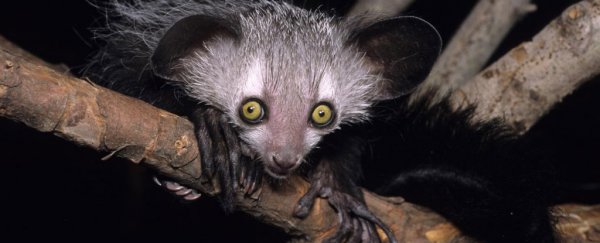In the first controlled study of its kind, researchers in the US have found that prosimian primates – represented by two aye-ayes and a slow (potentially slurring) loris – prefer their alcoholic beverages as strong as possible, thank you very much.
In feeding experiments, the three animals – two aye-aye lemurs called Morticia and Merlin, and their drinking buddy, Dharma the slow loris – showed they could discriminate between alcohol of different concentrations, but liked the strong stuff best.
Before you dob in the researchers to some ethics committee for intentionally spiking the animals' drinks, the scientists weren't trying to get these critters drunk.
Nope, the team from Dartmouth College in New Hampshire was looking to investigate what kind of fermented foods the animals are attracted to in their diets, to help understand how alcohol digestion works with naturally fermented nectars, saps, and fruits.
"The prevailing assumption is that alcohol is toxic, negatively affecting motor control, survival, and fitness," lead researcher Samuel Gochman told Discovery News.
"However, calories are scarce in the environment, and alcohol is a rich source of calories for primates with high metabolisms, so there may be nutritional benefits to consuming moderate amounts of alcohol that outweigh the costs, especially if a species has evolved a digestive system that can break it down hyper-efficiently, as ours does."
Aye-ayes are nocturnal lemurs native to Madagascar that live off eating grubs, but during the wet season they spend up to 20 percent of their feeding time sucking nectar from a primitive plant called the traveller's tree (aka Ravenala). In the lab, the researchers had to mock up the next best cocktail.
"Since we didn't have access to such flowering trees for the study, instead, we tested whether aye-ayes are attracted to alcohol in a nectar-simulating solution of sucrose," Gochman explains in a press release.
To test the aye-ayes' preferences, the researchers served Morticia and Merlin a randomised mix of drinks in separate containers, including tap water along with varying concentrations of alcohol in the solution – ranging from 0.0 to 5.0 percent in strength, reflecting the low levels found in nature.
They found that the aye-ayes not only preferred the highest concentrations of alcohol – drinking about twice as much of them as the lower concentrations – but would probe the high-concentration containers long after they were empty, suggesting that they wanted another hit.
"Compulsive digital probing for residual traces of alcohol suggests a strong attraction or craving," the researchers write in Royal Society Open Science (link down at time of writing).
The same tests with Dharma the slow loris – whose species snacks on fermented nectar from Bertram palms – indicated a similar taste for the strong stuff.
Notably, none of the animals exhibited any signs of intoxication in the experiments, showing no impairment in coordination or altered behaviour.
Which is just as well, really, as evolutionary biologist Matthew Carrigan from Santa Fe College, who wasn't involved with the study, explained to Traci Watson at USA Today.
"[I]t's a challenge to use those calories [in alcohol] without getting inebriated," he said. "If you are climbing around in the trees, 40 to 50 feet off the ground, perhaps at night and surrounded by predators, would you want to be drunk?"
Nope! So, the findings could suggest that the animals who seek out the boozier concentrations have an evolutionary advantage of some kind, Gochman says.
It's possible that animals that have learned how to handle their alcohol can use their greater tolerance to better store the high-energy content of fermented foods, and might even be able to locate such foods in the dark of night by the power of smell more easily.
"If the nectar is fermented, then the hyper-efficient alcohol digestion would make ecological sense," says Gochman. "Our results support the idea that fermented foods were important in the diets of our ancestors."
